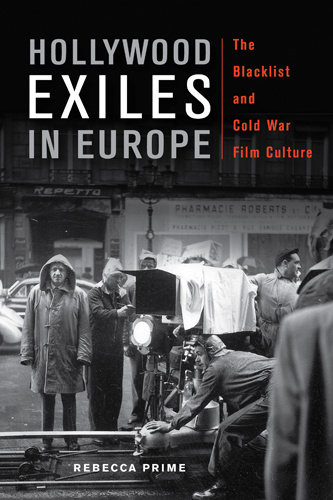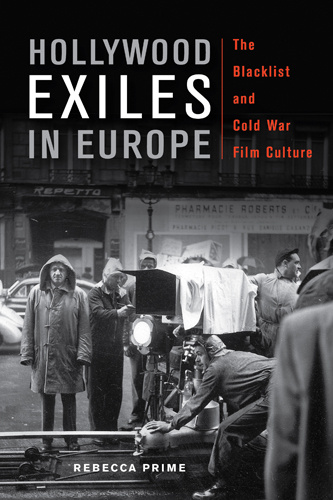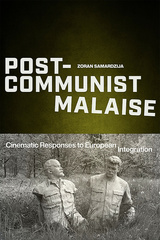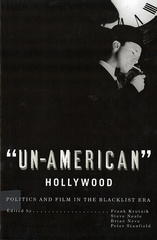
Hollywood Exiles in Europe
The Blacklist and Cold War Film Culture
Rebecca Prime documents the untold story of the American directors, screenwriters, and actors who exiled themselves to Europe as a result of the Hollywood blacklist. During the 1950s and 1960s, these Hollywood émigrés directed, wrote, or starred in almost one hundred European productions, their contributions ranging from crime film masterpieces like Du rififi chez les hommes (1955, Jules Dassin, director) to international blockbusters like The Bridge on the RiverKwai (1957, Carl Foreman and Michael Wilson, screenwriters) and acclaimed art films like The Servant (1963, Joseph Losey, director).
At once a lively portrait of a lesser-known American “lost generation” and an examination of an important transitional moment in European cinema, the book offers a compelling argument for the significance of the blacklisted émigrés to our understanding of postwar American and European cinema and Cold War relations. Prime provides detailed accounts of the production and reception of their European films that clarify the ambivalence with which Hollywood was regarded within postwar European culture. Drawing upon extensive archival research, including previously classified material, Hollywood Exiles in Europe suggests the need to rethink our understanding of the Hollywood blacklist as a purely domestic phenomenon. By shedding new light on European cinema’s changing relationship with Hollywood, the book illuminates the postwar shift from national to transnational cinema.
An enthralling read, beautifully written, immaculately detailed, and an absolute page turner, with each new chapter offering fresh insights on the lives and works of these talented artists forced to leave their homeland.
A thoroughly gripping and exquisitely researched book. Drawing on a rich array of archival and published sources, including interviews, correspondence, and studio records, Prime pieces together the story of those who fled the U.S. for Europe after their livelihoods, and indeed their lives, were put in jeopardy by the blacklist.
With its potent cocktail of Cold War political chicanery, farcical judicial horse-trading and all out betrayal, the Hollywood blacklist has long fascinated American film historians. Rebecca Prime’s Hollywood Exiles in Europe is a compelling addition because she has chosen to broaden the picture by addressing the lives and work of the blacklisted Hollywood filmmakers who sought exile in Europe. Prime’s book is far more than just about the settling of scores rather it gives a nuanced portrait of a turbulent time that begs not be repeated.
In Hollywood Exiles in Europe, Prime offers an analysis of the work of Hollywood exiles in Western Europe with extraordinary depth and clarity. It is a significant contribution to the field.
Written with clarity, precision and verve, this fascinating new chapter in the history of the blacklist and in relationships between American and European film is jam-packed with admirably well-researched information.
A thorough and fascinating story of an often overlooked part of a shameful period in American history.
Prime has produced a meticulously researched work that both fills a gap in the extant scholarship of the period and usefully complicates the historical perception of the artists whose careers were affected by the blacklist. Recommended.
Rebecca Prime's valuable Hollywood Exiles in Europe shines light on a surprisingly neglected corner of blacklist studies. There are wonderful photographs and the book is densely packed with information.
Vivid and informative. Prime’s book is perhaps most resourceful in showing how the films made abroad helped reshape the character of Hollywood’s own offerings.
Hollywood Exiles merits a special place in the literature of the blacklist, spawned by the 1947 House Un-American Activities Committee's investigation into the so-called communist subversion of the movie industry.
An enthralling read, beautifully written, immaculately detailed, and an absolute page turner, with each new chapter offering fresh insights on the lives and works of these talented artists forced to leave their homeland.
A thoroughly gripping and exquisitely researched book. Drawing on a rich array of archival and published sources, including interviews, correspondence, and studio records, Prime pieces together the story of those who fled the U.S. for Europe after their livelihoods, and indeed their lives, were put in jeopardy by the blacklist.
With its potent cocktail of Cold War political chicanery, farcical judicial horse-trading and all out betrayal, the Hollywood blacklist has long fascinated American film historians. Rebecca Prime’s Hollywood Exiles in Europe is a compelling addition because she has chosen to broaden the picture by addressing the lives and work of the blacklisted Hollywood filmmakers who sought exile in Europe. Prime’s book is far more than just about the settling of scores rather it gives a nuanced portrait of a turbulent time that begs not be repeated.
In Hollywood Exiles in Europe, Prime offers an analysis of the work of Hollywood exiles in Western Europe with extraordinary depth and clarity. It is a significant contribution to the field.
Written with clarity, precision and verve, this fascinating new chapter in the history of the blacklist and in relationships between American and European film is jam-packed with admirably well-researched information.
A thorough and fascinating story of an often overlooked part of a shameful period in American history.
Prime has produced a meticulously researched work that both fills a gap in the extant scholarship of the period and usefully complicates the historical perception of the artists whose careers were affected by the blacklist. Recommended.
Rebecca Prime's valuable Hollywood Exiles in Europe shines light on a surprisingly neglected corner of blacklist studies. There are wonderful photographs and the book is densely packed with information.
Vivid and informative. Prime’s book is perhaps most resourceful in showing how the films made abroad helped reshape the character of Hollywood’s own offerings.
Hollywood Exiles merits a special place in the literature of the blacklist, spawned by the 1947 House Un-American Activities Committee's investigation into the so-called communist subversion of the movie industry.
REBECCA PRIME is the Libman Professor of the Humanities and an assistant professor of art at Hood College. Her work has appeared in the edited volumes “Un-American Hollywood: Politics and Film in the Blacklist Era (Rutgers University Press); World Film Locations: Paris; and World Film Locations: Marseilles.
Introduction
1. The Radical Community in Hollywood
2. Life on the Blacklist: Production and Politics in Postwar Europe
3. The Blacklist and "Runaway" Production
4. The Blacklist, Exile, and the Transatlantic Noir
5. Cosmopolitan Visions, Cold War Fears
6. Blacklisted Directors, Art Cinema, and the Caprices of Film Criticism
7. The Legacy of the Blacklist
Conclusion
Notes
Selected Bibliography
Index







